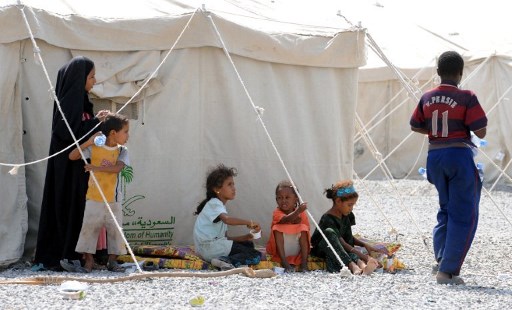
Photo: AFP
GAZA, Nov. 18 (Xinhua) -- It has been 12 days that Khaled Ahmed, a Palestinian child from the Gaza Strip's town of Beit Lahia, didn't see his mother, who is infected with the novel coronavirus.
Since she has been taken to a quarantine center located in Deir al-Balah in central Gaza, the 11-year-old boy was forced to isolate himself inside his bedroom, without meeting his siblings.
"He cannot stop crying for long hours, and refuses to talk to anyone other than our mother, who is usually talking with him via mobile phone," Abdul Rahman Ahmed, the older brother, told Xinhua.
He said his little brother often wakes up at night crying and calling for mother.
"This situation is not normal for us, and we are not aware of any special programs that can help our children to overcome the psychological problems they are currently experiencing," the 29-year-old young man complained.
So far, the blockaded coastal enclave has recorded more than 11,000 infections and 50 fatalities from COVID-19, according to the Hamas-run health ministry.
On Aug. 24, the interior ministry announced the first four infected cases inside the local community, and imposed a series of strict measures to avoid the spread of the virus.
As a result, local authorities closed universities, non-governmental institutions, public places and markets. They also shut down mosques and prevented public gatherings.
However, with the strip's unprecedented economic deterioration, the Hamas government decided to ease the lockdown, allowing people to gradually restore their daily routines.
Even though local authorities allowed secondary and prep schools to reopen, students were forced to abide by preventive measures set up by the government. At the same time, primary schools are kept closed.
Ghazal Mohammed, a 10-year-old girl from Gaza, said she feels sad because she needs to lock herself up in a room instead of playing with classmates.
"She lives like in a prison," Samiha Soboh, Ghazal's mother, said while preparing food for her five children.
The mother said that her daughter suffers from isolation and introversion, and her reaction has become violent.
"The instability of the situation in Gaza and the fact that some students were allowed to return to their schools while others were kept at home changed the behavior of my kids," the mother complained.
The situation is not the same with Sameh Hamdouna, a Palestinian child from al-Shatea refugee camp, located in the northwestern part of Gaza. The 11-year-old child and his five siblings suffer from worsening poverty.
Angham Hamdouna, Sameh's mother, told Xinhua that her husband lost his job in August after he was forced to stay at home for a long time.
The 40-year-old mother of six could only prepare one main meal a day, far from being enough to feed her children.
In a bid to escape the dire situation at home, Sameh often plays with his peers on the streets of Gaza without wearing a mask and or maintaining social distancing, which made him easy prey for the raging virus.
His mother said that she was afraid that her son could potentially get infected, but she is unable to keep him at home.
"It seems that the situation is getting worse in the Gaza Strip, which suffers from poverty and unemployment, and we do not know what to do when it comes to raising our children who have become more stubborn and distant from us," she added.
The Hamas-run Interior Ministry in Gaza threatened on Tuesday to impose a full lockdown on the coastal enclave if the infections continue to rise.
Iyad al-Bozom, Gaza's interior ministry spokesperson, told reporters that his government has taken various measures to avoid a comprehensive closure because of the great burdens it would have on the various sectors of the strip.
Dirdah al-Shaer, a Gaza-based psychologist, told Xinhua that children are the most affected by the consequences of pandemic in Gaza, as the closure caused their disconnection from the educational system.
Usually, children drain their energy through play and social interaction with their peers, and thus depriving them of these will have adverse effects on their behaviors, including resorting to isolation or violence.
Al-Shaer expects that the situation would deteriorate, which means that it would lead to a generation of vulnerable children.
According to data issued by the Palestinian Central Bureau of Statistics, almost half of the Gazan residents are children, the majority of whom live in precarious conditions.


